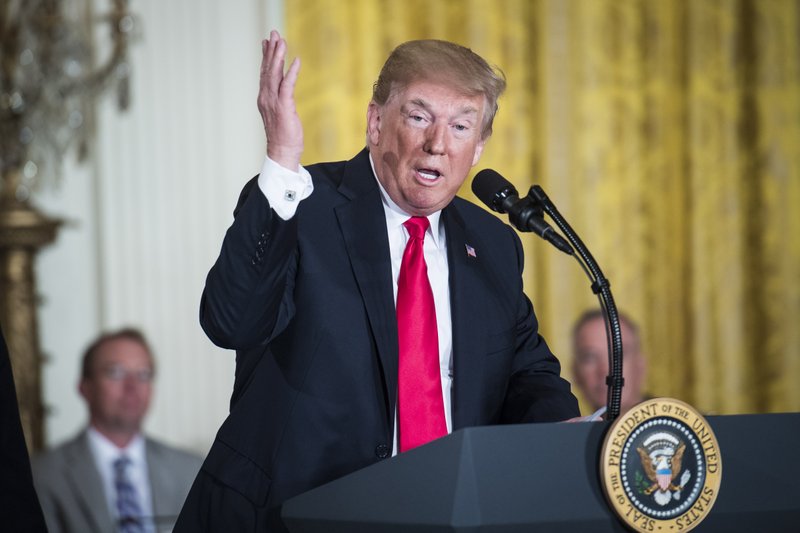President Donald Trump abruptly reversed himself Wednesday and signed an executive order halting his administration's policy of separating children from their parents when they are detained illegally crossing the U.S. border.
It was a dramatic turnaround for Trump, who has been insisting, wrongly, that his administration had no choice but to separate families apprehended at the border because of federal law and a court decision.
The news in recent days has been dominated by images of children held in cages at border facilities as well as audio recordings of young children crying for their parents — images that have sparked anger and concern from Republicans about a negative effect on their races in November's midterm elections.
Until Wednesday, the president, Homeland Security Secretary Kirstjen Nielsen and other officials had repeatedly argued the only way to end the practice was for Congress to pass new legislation, while Democrats said Trump could do it with his signature alone. That's what he did Wednesday.
[FULL TEXT: Read Trump's executive order]
"We're going to have strong, very strong borders, but we're going to keep the families together," said Trump who added that he didn't like the "sight" or "feeling" of children separated from their parents.
The order does not end the "zero-tolerance" policy that criminally prosecutes all adults caught crossing the border illegally. It keeps families together while they are in custody, expedites their cases, and asks the Department of Defense to help house them.
Justice Department lawyers have been working to find a legal workaround for a previous class-action settlement that set policies for the treatment and release of unaccompanied children who are caught at the border. Trump's new order states the attorney general will seek to modify the agreement, known as the Flores settlement, to allow Homeland Security to detain families together until criminal and removal proceedings are completed.
Trump's order leaves room to separate children from parents if it's best for the child's welfare.
Assessments for possible detainee use have been done at three bases in Texas: Dyess Air Force Base, Goodfellow Air Force Base and Fort Bliss. An assessment is expected Thursday at Little Rock Air Force Base in Arkansas.
[RELATED: Governor says federal agency considering 2 sites in Arkansas to house migrants]
The Alabama-based Southern Poverty Law Center said the order didn't go nearly far enough.
"The administration still plans to criminalize families — including children — by holding them in prison-like detention facilities. There are workable alternatives," president Richard Cohen said in a statement.
It's also unclear what will happen to the children already separated. Health and Human Services Secretary Alex Azar said his department will start reuniting detained immigrant children with their parents — but he made no specific commitment on how quickly that can be accomplished.
Trump's family apparently played a role in his turnaround.
A White House official said first lady Melania Trump had been making her opinion known to the president for some time that she felt he needed to do all he could to help families stay together, whether by working with Congress or acting on his own.
And daughter Ivanka Trump tweeted, "Thank you @POTUS for taking critical action ending family separation at our border."
Homeland Security Secretary Nielsen traveled to Capitol Hill on Wednesday afternoon to brief lawmakers. And lawmakers on the fence over pending immigration legislation headed to the White House to meet with Trump.
Two people close to Nielsen said she was the driving force behind the turnabout that led to the new order keeping families together. Those people were not authorized to speak publicly and commented only on condition of anonymity.
One of them said Nielsen, who had become the face of the administration's policy, had little faith that Congress would act to fix the separation issue and felt compelled to act. She was heckled at a restaurant Tuesday evening and has faced protesters at her home.
Trump had tweeted early Wednesday, before issuing his order: "It's the Democrats fault, they won't give us the votes needed to pass good immigration legislation. They want open borders, which breeds horrible crime. Republicans want security. But I am working on something - it never ends!"
The "zero tolerance" policy put into place last month moves adults to the custody of the U.S. Marshals Service and sends many children to facilities run by the Department of Health and Human Services.
Under President Barack Obama's administration, such families were usually referred for civil deportation proceedings, not requiring separation. There currently are three family detention centers with a total 2,700-bed capacity.
The policy had led to an increase in family separations in recent weeks, with more than 2,300 minors separated from their families at the border from May 5 through June 9, according to Homeland Security.
The Flores settlement, named for a teenage girl who brought the case in the 1980s, requires the government to release children from custody and to their parents, adult relatives or other caretakers, in order of preference. If those options are exhausted, authorities must find the "least restrictive" setting for a child who arrived without parents.
In 2015, a federal judge in Los Angeles expanded the terms of the settlement, ruling that it applies to children who are caught with their parents as well as to those who come to the U.S. alone. Other recent rulings, upheld on appeal, affirm the children's rights to a bond hearing and require better conditions at the Border Patrol's short-term holding facilities.
In 2016, the 9th U.S. Circuit Court of Appeals ruled that child migrants who came to the border with parents and were held in custody must be released. The decision did not state parents must be released. Neither, though, did it require parents to be kept in detention, apart from their children.
Read Thursday's Arkansas Democrat-Gazette for full details.
